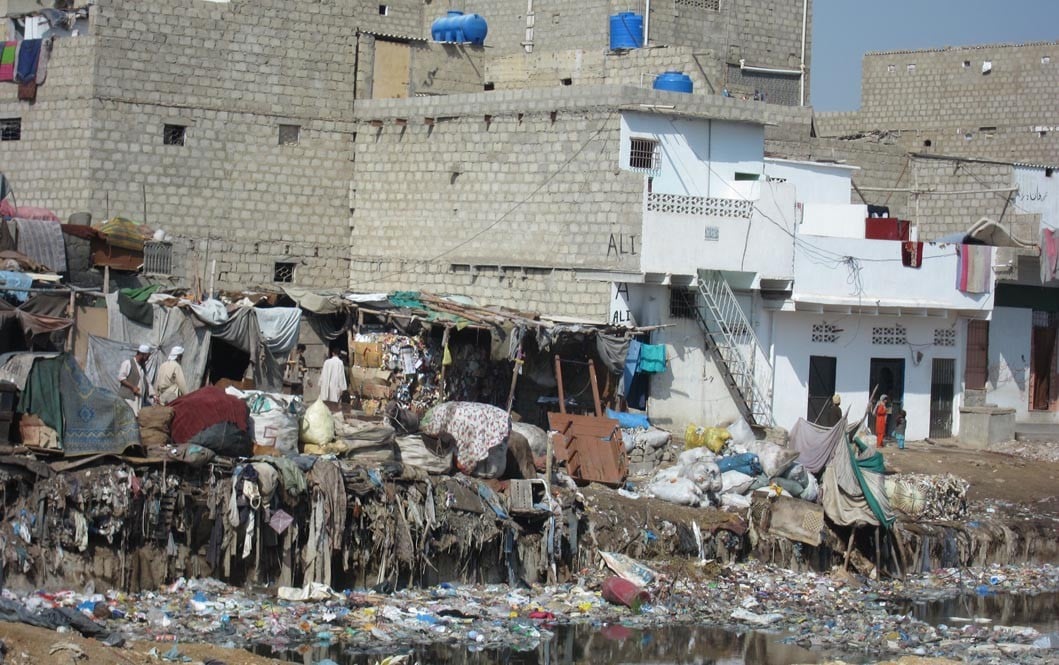
The prime minister’s Rs25 billion development package for Karachi seems to be another half-hearted bid to solve the city’s multiple developmental and governance challenges

Prime Minister Shahid Khaqan Abbasi has announced a Rs25 billion development package for Karachi during his visit to the metropolis on August 12. Many of his political colleagues referred to it as renewed commitment of the centre towards the city that suffers from multiple developmental and governance challenges.
As one reviews the trends of developmental outlays during the recent past, one aspect is stark clear. The regimes are very keen to steer development through a bucket full of projects. For the bureaucrats, politicians, technocrats, contractors and suppliers, it makes a lot of worth. Quick initiation through tenders, ample opportunity to include individual choices and whimsical demands, easy releases of mobilisation and procedural funds, finite completion time, possibility to get folks of choices employed or indirectly benefitted and enormous political dividend to trumpet completion as a testimony of success are some attributes.
The sufferers in this state of affairs are the people of Karachi. Numerous situation analysis exercises done in the recent past inform us about the looming shortcomings in the project bound approaches.
Revival of Karachi Circular Railways (KCR) has been cited as a much desirable project by successive regimes. It successfully operated between 1969 and 1999. City mobility infrastructure was aligned to accommodate its operations in the form of several overpasses constructed to separate vehicular traffic and train movements. Interestingly, as the passenger trips continued to rise -- generating more justifications for greater options for mobility -- KCR was closed down. At that time, a foreign-funded and supported Karachi Mass Transit Programme was assigned greater priority. It was never implemented.
Today, the Bus Rapid Transit Programme, with huge capital outlays, has been promoted. But the simple and easy to revive KCR is still on the backburner. The Japanese International Cooperation Agency (JICA) made lengthy efforts to make the KCR run on rails. Now our federal and provincial governments, in their infinite wisdom, have made KCR a part of the CPEC. Possibilities of KCR revival seeing the light of the day is still shrouded in doubts.
While billions have been allocated and spent through regular and special packages, Karachi has not seen any option created for housing the millions who come to the city every year. As a result the scale and complexity of informal settlements (katchi abadis) is increasing. The number of these settlements is believed to have risen to over 1200.
No mega project or development package in the recent past seems to have addressed the housing and squatter upgradation issue in Karachi. On October 13, 2016, the Sindh chief minister had directed the Sindh Katchi Abadis Authority (SKAA) and other senior officials to prepare a plan to upgrade 100 katchi abadis (squatter settlements) in the province to the level of townships. A presentation was given by concerned officials apprising the chief minister about the existing state of affairs related to katchi abadis. Despite the passage of about a year, no progress appears in sight. The present package is also not likely to fetch any allocation to address this vital affair.
A visit to most locations in Karachi displays the poor cleanliness status of our neighbourhoods, public spaces, streets, playgrounds and open spaces. Many far flung places in Orangi, Baldia, Qasba, Lyari and Landhi show that garbage has not been lifted for months (perhaps years). The municipal tier of administration decries absence of funds to undertake any service delivery exercise. The provincial administration invents ways that can keep the local administration completely powerless in respect to its assigned duties.
A Chinese waste management concern has mobilised its equipment and fleet for municipal waste collection in Karachi South and East. High promises have been made by the Sindh government that the city would become cleaner in a short while. A whooping figure of Rs2 billion per annum has been agreed for this task by the Sindh Solid Waste Management Board (SSWMB). The contractor also pledges to generate electricity by installing ‘waste to energy’ plants at the designated landfill site.
But since this move was against the usual norms and that SSWMB could not show any reasonable performance, the Supreme Court led Judicial Commission -- that investigated the water and sanitation conditions in Sindh since December 2016 -- recommended to close down the SSWMB. The matter is being legally contested. However, no development package or allocation ever recommended any medium or long-term planning of the solid waste management in the city.
Karachi is mired in various challenges that must be addressed from a holistic perspective. One needs to go beyond packages and one-time projects in segregated sectors for an overall change -- very intensely desired in the metropolis since long. A consensus needs to be built around the future format of governance, physical form and land management of the city. The Karachi affairs need a political equation that addresses her outstanding problems.
Political parties that claim to represent Karachi periodically demand the status of a separate province for the metropolis. However, there are many ways of working within the existing constitutional scheme to benefit Karachi and millions of her residents. Politicians can consider formulating a political framework where provincial government can supervise the metropolitan affairs after granting a separate autonomous administrative status to Karachi. This could be called as Greater Karachi Metropolitan Administration. Within this arrangement, the mayor Karachi can become the executive functionary with enhanced financial and administrative powers. The stakeholders of the metropolis must be mainstreamed through a consultative platform to voice and deliberate the concerns and issues faced by them.
The city needs its rightful share in recurring and development funds. The former can be extended by the province while the National Finance Commission may consider having special provisions for large cities. The present census results also show that this makes a rational demand with 20 per cent population residing in 10 large cities.